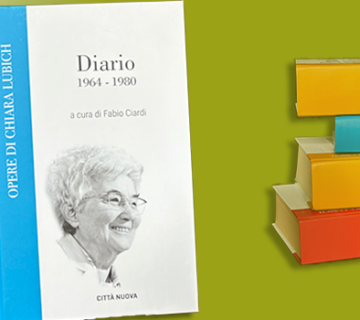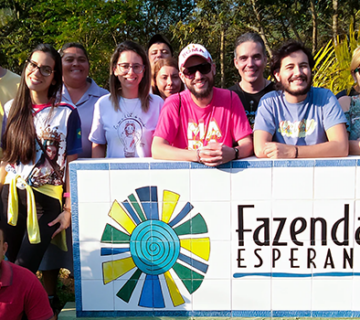With her reassuringly calm demeanour, mother-of-two Maria – born in Italy, married to a French man – teaches her mother tongue in a notorious neighbourhood on the outskirts of Paris, in one of those schools which finds it practically impossible to retain its staff. In fact, determination, courage and passion are all required in no small measure to be able to work in such a disadvantaged area, scarred by drug and arms trafficking, with dealers right at the school gates. The pupils come from a wide range of cultures and different nationalities. Maria reflects, “For me, it’s quite simply a matter of responding to a calling to work for equal opportunities, to propose and deliver a programme of formation that aims high, and to bring the love of Christ where it seems to be lacking.” Maria explains how coming into contact as a child with Chiara Lubich nurtured this aspiration and sustained her into adult life. “Thanks to the relationships of unity I live with those who share this same ideal, I’m able to refresh my outlook and attitude every day, whatever difficulties I face.”
It was a real challenge, especially at the start, to understand how to interact constructively with the students, how to react to their verbal aggression and acts of vandalism. It soon became clear that in order to be able to help the children, it was necessary to get the families involved. In addition, the constant stream of new teaching staff needed support in order to engage effectively with such a complex situation. This kind of supportive synergy among colleagues gave an excellent example to the students. Maria continues,“From an educational perspective, I base my work on an interdisciplinary approach incorporating cultural projects. The organisation of any project requires teamwork, and our attempt as colleagues to live in the spirit of fraternity, offers a credible model to the students.” These projects often conclude with a trip to Italy, both motivating the students to learn the language and encouraging cultural exchanges with Italian youth, which can also provide an enriching experience of fraternity.
“This kind of project,” relates Maria, “leads to the involvement of our pupils’ families in the life of the school, it establishes a relationship of trust in which we can seek solutions together so that no student is held back by economic problems.”
In other words, Maria’s objective is to create an educational network involving families and teachers, all striving for the human and cultural development of these at-risk children. It is an approach which is already showing positive results.
When Aïcha was disrupting her class, it was quietly – but firmly – explained to her how “everyone must do their part to live in harmony”. Her response was to write, “I’m sorry for how I behaved on Friday. I let myself down and it’ll not happen again. You’re a great person, you’re clever and wise. You pass true values onto your students and make us want to do well. I’ll never forget you.”
The care and respect given to each child encouraged another pupil, Yanis, who was at first extremely reserved, to open up and display a hitherto unexpressed interest in art and history. The key is always the personal care and attention due to each individual with their own story and their own sensitivity. “I’ve learnt never to expect immediate results,” concludes Maria. “When a young person shows no sign of improvement, it’s important to keep on believing in them, accompanying them, not allowing yourself to be blocked by anything, but continuing to identify the positive within them and giving value to that. Every day, the challenge is to find the courage and strength to nurture hope through actions aimed at building true relationships”.


 Italiano
Italiano Español
Español Français
Français Português
Português



No comment